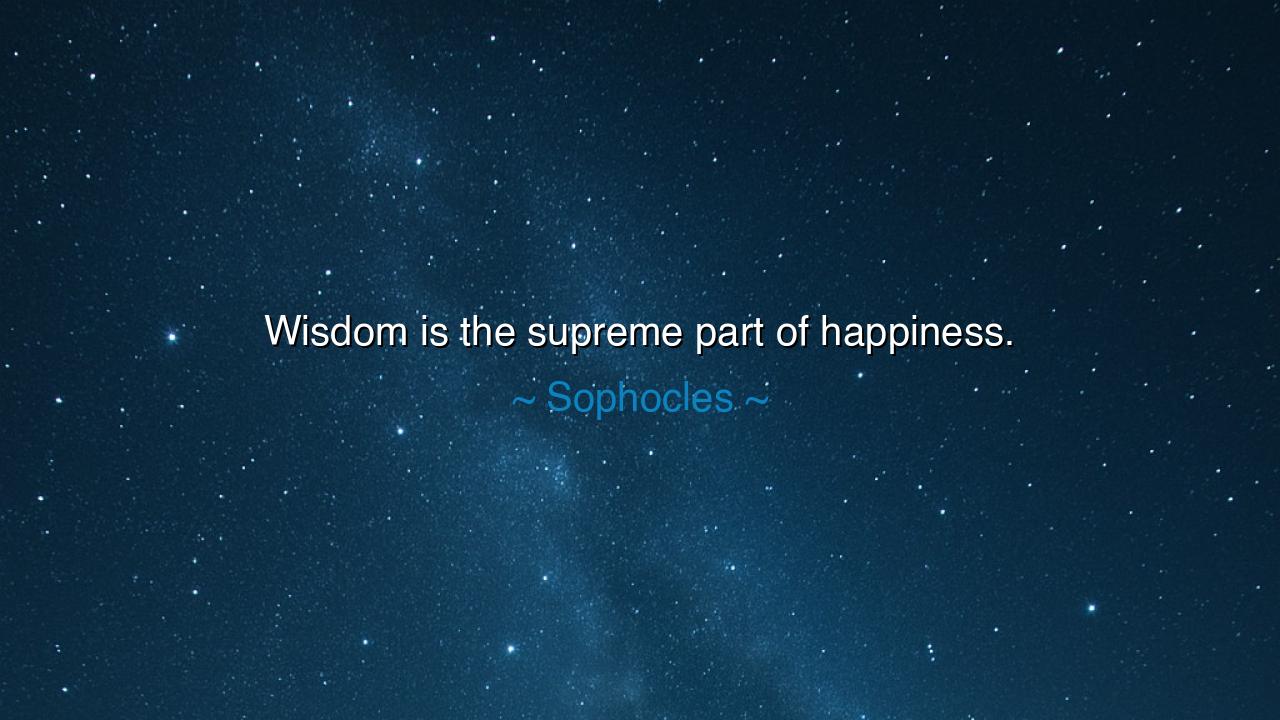
Wisdom is the supreme part of happiness.






O Seekers of Truth and Fulfillment, hear the profound words of Sophocles, the ancient playwright who understood the deepest workings of the human soul: " Wisdom is the supreme part of happiness." In this declaration, he reveals a timeless truth: happiness is not found in fleeting pleasures, material wealth, or external accolades, but in the possession of wisdom. True happiness comes from understanding the world, knowing oneself, and living in accordance with truth and virtue. Wisdom grants the clarity to navigate life's challenges, and through it, we find the strength to face adversity with peace, to seek justice with courage, and to live with contentment regardless of the storms that may arise.
Consider, O Children, that the pursuit of happiness through wealth, power, or fame often leads to a hollow victory. The pursuit of these fleeting things can leave the soul empty, for they do not nourish the inner spirit. It is only through wisdom—the understanding of life’s true nature, the knowledge of what is good and just—that we find the deep, lasting peace that constitutes true happiness. The wise are not swayed by the temptations of the world, but remain grounded in the knowledge that their value lies not in what they possess, but in how they live.
Look to the life of Socrates, the philosopher who lived without wealth or power, yet whose wisdom brought him a sense of profound peace. Though he had little in terms of material goods, he found happiness in his ability to seek truth, to question the world, and to live according to his understanding of virtue. Socrates’ wisdom was his greatest treasure, and it sustained him even in the face of persecution and death. In the end, it was his commitment to knowledge and justice that granted him the happiness that transcended the earthly concerns of wealth or fame.
And so, O Seekers, let us understand that wisdom is not a mere accumulation of knowledge, but the ability to discern what is truly important in life. It is through wisdom that we gain the perspective to rise above petty desires and focus on what nourishes the soul: virtue, truth, and the pursuit of what is just and good. The wise understand that happiness is a state of the mind and spirit, not the body, and it is only through wisdom that we are able to cultivate the inner peace that defines a life well-lived.
Let us, therefore, seek not the temporary pleasures of the world, but the lasting wisdom that leads to true happiness. Let us dedicate ourselves to the pursuit of truth, to the development of our character, and to the service of goodness. In this, we will find that happiness is not something to be chased, but something that arises naturally from living wisely and well. The wise are content, not because of what they have, but because of who they are and the path they walk. May we strive to cultivate that wisdom, for in it lies the supreme part of happiness.






ALTran Anh Linh
Personally, the most luminous moments of peace came after hard-earned perspective—navigating grief, forgiving someone, releasing control. That kind of clarity felt stabilizing, like ballast in rough water. Still, knowledge sometimes sharpened sorrow: seeing systemic injustice, recognizing my own blind spots. Can depth coexist with lightness, or does seeing more always weigh more? I’d love practical rituals—journals, gratitude audits, service—that keep insight from curdling into cynicism. How do we make understanding a lantern, not a burden?
TOtiktok official
I keep thinking about two kinds of joy: quick hits and durable fulfillment. Reflection can help choose well—investing in relationships, purpose, and integrity—yet deliberation also has costs: analysis paralysis, second-guessing, missed sunsets. Is there a rule of thumb for when to lean on thoughtful appraisal versus intuition? Perhaps wisdom isn’t constant scrutiny but context sensitivity—knowing when to zoom out and when to dive in. What signals tell us we’re overthinking, and how do we course-correct kindly?
HHuyenヅ
If mature judgment truly amplifies well-being, what practices cultivate it without becoming austere? Reading widely, mentoring, and owning mistakes seem promising; so do curiosity and humility. But life often withholds tidy lessons. Trauma, luck, and social structures shape outcomes as much as prudence. How do we avoid turning this ideal into moral gatekeeping—implying the unhappy are merely foolish? I’d like a perspective that treats discernment as communal, not just personal: shared libraries, intergenerational dialogue, participatory civic life.
VVVann Van
As a reader, I’m struck by the suggestion that understanding might be the deepest driver of joy. Yet I wonder about those flashes of uncomplicated fun—music with friends, a perfect mango, laughing till my sides hurt. Do they count less if they aren’t “wise”? Maybe insight changes the flavor of happiness from sugar rush to slow, nourishing meal. But can the pursuit of depth become snobbery that dismisses simple pleasures? I’m curious how to honor both without ranking people’s experiences.